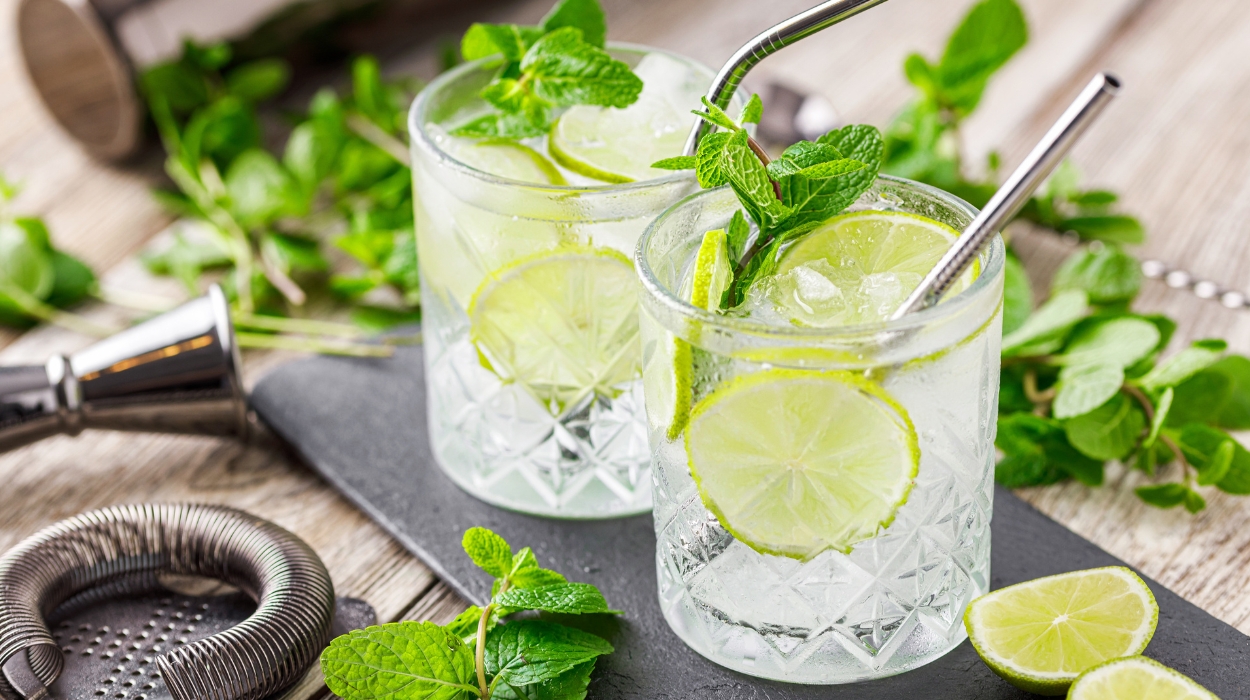Lemons have long been known as a natural remedy for various health conditions. Due to their high vitamin C content, they have been used to boost immunity, treat infections, and restore nutritional imbalances.[1]
Interestingly, lemon juice combined with water has gained increasing popularity as a weight loss drink to support burning fat. But is there any science behind this detox water for weight loss trend?
In this article, we will explore how to make lemon water to lose belly fat. We’ll dive into the science behind why this drink can support weight loss, how to lose belly fat with lemon water, and discuss potential benefits and side effects to be aware of.
How To Lose Belly Fat With Lemon Water?
Here are nine effective ways to lose belly fat with lemon water:
- Increase hydration.
- Improves digestion.
- Increase detox.
- Boosts the immune system
- Reduce hunger.
- Improve the skin.
- Alkalizes the body.
- Reverses aging processes.
- Balances blood sugar.
How To Make Lemon Water To Lose Belly Fat?
Lemon water, made from the citrus fruit’s lemon juice, can be a potent tool to help support weight loss efforts and boost overall health. But there isn’t just one way to add lemon water to your diet. Fortunately, combining lemon water with other ingredients can provide additional health benefits. Below are nine ways to learn how to lose belly fat with lemon water.
Lemon Water
The simplest and most effective way to harness the weight-loss powers of lemon is by making standard lemon water. To make lemon water, squeeze the juice of half of a lemon into a glass of warm water. Stir the ingredients together and drink on an empty stomach.
Lemon water contains high concentrations of health-boosting[2] ingredients such as antioxidants and vitamin C, which may lower inflammation and support weight loss.
Lemon juice has also been show[2] to reduce the inflammatory marker C-reactive protein, or CRP, which plays a role in worsening cholesterol levels and blood sugar levels. Supplementing with lemon may reduce CRP and improve cholesterol and blood sugar levels.
Consume lemon water with a healthy diet and exercise to see maximum weight loss results.
Lemon Water & Mint

If you want to add a refreshing twist to your typical lemon water, combine it with a sprig of fresh mint. Mint, mostly known for its potent fresh flavor, also has been shown[3] to support digestion, relieve constipation, reduce nausea, and soothe the stomach. Its ingestion may also support digestive health by killing harmful bugs or bacteria.
To make mint lemon water, crush a few fresh mint leaves and add them to your glass. Next, add water and the juice of a lemon. Allow the flavors to infuse for a few minutes before enjoying this refreshing beverage.
Lemon Water & Honey
If you have a sweet tooth, lemon water with honey can provide a natural energy source because it slowly releases glucose and fructose into the bloodstream, avoiding sugar spikes. This slow release can also help prevent unwanted snacking and support fat loss efforts.
To prepare lemon water with honey, squeeze the juice of half of a lemon into warm lemon water and add honey. Only a teaspoon of honey is necessary.
Try to use organic honey sources, free of any artificial sweeteners or preservatives to support your diet. Stir the mixture well and prepare yourself for a delicious treat.
You can also try making this drink hot, as some research has shown[4] that warm water may improve bowel movements and can support digestion. Warm lemon water will also help the honey mix more evenly with the lemon water, providing a more balanced flavor.
Regarding weight loss, research[5] has shown that a lemon water detox, consisting of a low-calorie diet, lemon water, organic maple, and palm syrup, in overweight women resulted in a reduction in body fat and insulin resistance. This variation of lemon water may not only support weight loss but also help individuals with diabetes gain better control over their disease.
Lemon Water & Apple Cider Vinegar
Apple cider vinegar has gained a great deal of popularity for its ability to promote effective weight loss, especially when combined with lemon. One research study[6] assessed the use of apple cider vinegar on weight management in overweight or obese individuals on a restricted calorie diet. It found that apple cider vinegar significantly reduced body weight, body mass index, hip circumference, body fat, and appetite.
To make lemon water with apple cider vinegar, combine the juice of half a lemon with one tablespoon of apple cider vinegar in a glass of water. Stir the ingredients well before drinking.
Lemon Water & Ginger
Ginger has long been recognized[7] for its digestive healing, anti-inflammatory, and antioxidant properties. It also has demonstrated promise as an agent to support weight loss. Research[8] has demonstrated that supplementation with ginger significantly decreased body weight, waist-to-hip ratio, fasting glucose, and insulin resistance.
To prepare lemon ginger water, peel and grate half an inch of fresh ginger. Add the grated ginger to a cup of hot water, squeezing in the juice of a lemon. Stir the combination and enjoy the spicy but soothing flavors of this weight-loss drink.
Lemon Water & Turmeric

Turmeric, known for its bright orange color and spicy flavor, comes from the root of a flowering plant in a similar family to ginger. Some users view turmeric as one of the best herbs for weight loss. This spice contains the active ingredient curcumin, which has gained popularity as a weight loss remedy.
Research[9] has shown that curcumin may contain anti-obesity properties associated with how the body uses energy and burns and stores fat. Curcumin also has properties that help reduce inflammation, which may also support weight loss efforts.
To prepare this fat-burning beverage, mix the juice of a lemon with a small pinch of turmeric in hot water. Make sure to stir the turmeric into the lemon water to create an earthy, flavorful, fat-burning drink.
Lemon Water & Cayenne Pepper
If you love that extra punch of spice, try mixing your usual lemon water with a dash of cayenne pepper. The active ingredient in cayenne pepper, capsaicin, can help reduce your appetite, boost metabolism, and help you burn calories. It has become an active ingredient in many popular health and nutrition supplements.
Research[10] into the effects of capsaicin has demonstrated that supplementation can increase fullness and reduce the desire to eat. Suppression of appetite can promote weight loss and allow individuals to stick to lower-calorie diets.
Another study[11] evaluating capsaicin’s influence on healthy individuals’ percentage of body fat and fat mass, found that after 12 weeks of supplementation there were significant reductions in both parameters. These findings are very encouraging for individuals looking to reduce body fat and promote losing weight.
To make cayenne lemon water, mix the juice of half a lemon with a small pinch of cayenne pepper. Add the ingredients to a cup of warm water. Make sure to stir the ingredients together and let them fully dissolve before enjoying this fiery fat-burning beverage.
Lemon Water & Cinnamon
Cinnamon is one of the most well-known spices with many health benefits,[12] including preventing cancer, diabetes, inflammation, and tissue damage. It is no surprise that this powerful spice has gained a substantial amount of evidence for its potential use as a therapeutic agent to reduce weight in obese and overweight individuals.
One study[13] viewing the effects of cinnamon supplementation on overweight or obese patients found significant reductions in waist circumference compared to placebo. Similar positive findings were reported in a 2020 review,[14] with subjects experiencing substantial reductions in body weight, significantly decreased body weight, BMI, waist circumference, and total fat.
Adding cinnamon lemon water to your diet may provide the boost you need to hit your weight loss goals. To make cinnamon lemon water, mix the juice of half a lemon with a pinch of ground cinnamon in a cup of warm water. This burning belly fat beverage should be stirred to allow the ingredients to dissolve before enjoying.
Lemon Water & Cucumber
Cucumber lemon water is a refreshing version of the traditional lemon water variety. What makes this drink so unique is that cucumbers[15] are extremely low in calories yet provide a refreshing flavor that you can’t find anywhere else. The low-calorie content of this drink makes it a safe drink for intermittent fasting.
Cucumbers are also high in fiber and water, which makes them a great way to promote hydration and support weight reduction.
Animal studies[16] have demonstrated that consumption of sea cucumber resulted in weight loss. It also improves glucose tolerance and insulin resistance, which are often caused by obesity and can lead to diabetes. These results are promising because human cucumber consumption may result in similar anti-obesity and anti-diabetic effects.
To make cucumber lemon water, slice into round cucumber slices. Add these slices to a large glass of cold water and then squeeze in the juice of a fresh lemon. Try letting this sit for a bit so the flavors can combine to provide a refreshing weight-loss drink.
Benefits Of Lemon Detox Water
After learning how to lose belly fat with lemon water,, it is important to recognize that lemon detox water also offers many advantages for your overall health. We will delve into the unique benefits of lemon detox water and how it can support your overall health, weight loss, and digestion.
Increases Hydration
Lemon water is a low-calorie drink that can help you stay hydrated throughout the day. Research[17] has demonstrated that increased hydration may result in weight loss due to increases in metabolism. Increasing hydration throughout the day by consuming lemon water may increase your metabolism resulting in greater fat loss.
So, how much water do you need to drink daily to lose weight? Although there is no exact recommendation for losing weight, try drinking the general guidelines of at least eight 8-ounce glasses of water per day. This amount is equal to 64 ounces or about 1.9 liters.
Improves Digestion
Lemon water can help improve digestion and reduce gastrointestinal symptoms. Research[18] has shown that lemon can increase gastric motility, which may normalize bowel movements. It may also reduce nausea and neutralize stomach acids that can result in the relief of acid reflux. Adding lemon water to your diet can help eliminate common digestive complaints.
Increases Detoxification
Lemon has been shown to have natural detoxification properties. Research has demonstrated consuming lemon extract normalized liver function tests and stimulated liver detoxification pathways. Adding lemon detox water to the diet can stimulate the natural detoxification pathways and flush out toxins from the body, which may support overall health and reduce weight.
Strengthens Immune System
The high vitamin C content in lemon can help to strengthen the immune system. Lemon has properties[18] that allow it to kill bacteria, fungi, parasites, and cancer. Incorporating lemon juice into your drinks may strengthen the immune system and help you fight off invaders, contributing to overall health.
Improves Skin Health
The high vitamin C content in lemon water can improve skin health. Research[19] has shown that vitamin C is vital in promoting collagen formation, removing free radicals that cause skin damage, and may prevent dangerous skin cancer. Adding lemon water to your diet can encourage the appearance of healthier-looking skin and potentially reduce skin cancer risks.
Alkalizing Properties
Despite the sour and acidic taste, lemon water has an alkalizing effect on the body, which can help the body balance pH levels. Lemon water[20] can restore the natural gastric balance and function, reduce acid reflux, support digestion, decrease the burning sensation due to high acid levels in the stomach, and soothe the inflamed lining of the stomach.
Curbs Appetite
Lemons contain high amounts of the soluble fiber, pectin. Research[21] has shown that fiber slows gastric emptying, which increases feelings of fullness and curbs appetite, supporting weight loss. Lemon water can prevent overeating and lead to better overall health.
Best Time To Drink Lemon Water To Lose Weight
If you want to optimize the benefits of lemon water, does it matter if you drink it morning, noon, or night? Drinking a glass of lemon water can be beneficial at any time of day, but we’ll look at the potential benefits of each time and the science behind why.
Before Meals
Drinking lemon water before your meals may help reduce overeating throughout the day.
Research[22] has shown that drinking water before a meal may support weight loss by sending signals to your brain that you are full. It is also believed that replacing high-calorie drinks with low-calorie lemon water can also help to limit your caloric consumption throughout the day.
Additionally, instead of having a high-calorie orange juice or soda, enjoying each meal with a low-calorie lemon water can limit your overall calorie consumption to promote weight loss.
In combination with a healthy diet, lemon water before each meal may curb your appetite and stop you from overeating.
Throughout The Day
Having lemon water throughout the day has a similar effect as consuming lemon water with each meal – it keeps you full and hydrated, preventing you from reaching for unhealthy snacks.
The brain can sometimes confuse thirst signals for hunger signals. This is based on an individual’s interoception,[23] or ability to discern or interpret the signals the body sends accurately. Researchers[24] believe this issue may lie in the weakness of thirst signals compared to hunger signals, although an exact conclusion has not yet been found.
Every time you reach for your lemon water throughout the day, you are keeping your body hydrated, promoting weight loss, and reducing hunger cravings.
Before Bed
Drinking lemon water before bed can promote overnight detoxification and increase hydration, supporting your weight loss journey.
Most detoxification in the body occurs while we sleep and enter into the rest and digest state of the nervous system or parasympathetic[25] branch. This branch of the nervous system promotes healing, digestion, and detoxification.
Due to lemon’s natural detoxification processes, consuming this drink at night can support your body’s natural detoxification pathways. Consuming lemon water at night can help flush out toxins from the body and keep your general well-being.
Potential Side Effects
Although consuming lemon is generally safe for most individuals, it is crucial to know the potential side effects. We will discuss some of the most significant adverse effects to be mindful of.
Tooth Enamel Erosion
Lemon is a highly acidic citrus fruit and can potentially erode[26] the enamel of the teeth over time. To minimize this risk, drink lemon water through a straw and rinse your mouth after consumption to limit residue.
Acid Reflux
If you consume lemon water, you may trigger acid reflux symptoms. Due to its high acid content, lemon water may irritate the stomach lining in some individuals. On the other hand, in individuals with acid reflux due to low stomach acid content, lemon has been shown[27] to improve symptoms.
Allergic Reactions
Some individuals may have sensitivities to lemon or citric acid. They can also be allergic to any of the contents in the specialized lemon water beverages, such as cayenne, turmeric, or honey. If so, you may experience an allergic reaction. Allergic reactions[28] can result in the following symptoms:
- Rash.
- Hives.
- Swelling.
- Itching.
- Shortness of breath.
- Nausea.
- Vomiting.
- Abdominal pain.
- Anaphylaxis.
If you experience any symptoms of an allergic reaction, be sure to contact your medical provider immediately.
Specific allergic reactions, known as anaphylaxis, can be fatal. Seek emergency medical care immediately if you experience symptoms of anaphylaxis, such as shortness of breath, wheezing, or lightheadedness.
Increased Urination
Lemon water has diuretic[29] properties that can cause an individual to produce more urine. Additionally, adding more fluids to your daily routine can also increase urination.
If you experience increased urination after starting lemon juice, speak to your physician to ensure this detox drink is safe for you.
Conclusion
Lemon water is a refreshing and often beneficial addition to a weight loss regimen. The combination of high vitamin C and rich antioxidant content of lemon juice can support metabolism, boost digestion, and promote hydration.
If you are on a weight loss journey and enjoy lemon water, try experimenting with different variations of the drink that include additional ingredients that can contribute to weight loss. Some of the most popular variations include lemon mint water, lemon apple cider vinegar water, lemon ginger water, and lemon honey water. Although some of these mixtures may sound different, you will likely find one that is both effective and will suit your taste buds.
As always, before starting any new medical treatments, consult with your healthcare professional. They will be able to guide you regarding whether adding lemon water to your healthy diet and lifestyle can contribute to long-lasting weight loss. Always listen to your body, practice moderation, and consult with a doctor if you experience any side effects.
Frequently Asked Questions
Lemon water can be consumed any time of day. Consider drinking it on an empty stomach to promote feelings of fullness, before bed to assist with detoxing, or throughout the day to stay hydrated and avoid cravings.
Lemon water can be consumed any time of day. Some people prefer a warm cup of lemon water before bed to unwind, while others prefer a cold glass in the morning.
Although lemon water will not magically reduce belly fat, it can effectively reduce weight in combination with a healthy diet and regular exercise. It does so by supporting digestion and promoting feelings of fullness.
Drinking lemon water daily is generally safe for most people. However, there are some potential side effects to be aware of. This includes tooth enamel erosion, worsening of acid reflux, increased urination, and allergic reactions.
 Evidence Based
Evidence Based

